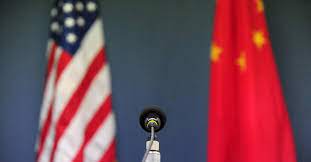Nike Ching
Taiwan’s President Tsai Ing-wen returns to the United States this week where she will meet with House Speaker Kevin McCarthy and other lawmakers in an event that Beijing has said it firmly opposes. Tsai will talk with McCarthy and a group of other lawmakers at the Ronald Reagan Presidential Library and Museum in Simi Valley, California, on Wednesday in what McCarthy’s office calls a “bipartisan” meeting.
Last week, a Foreign Ministry spokesperson said China firmly opposes the meeting and will “closely follow the development of the situation and resolutely defend national sovereignty and territorial integrity.” It’s still unclear whether Tsai and McCarthy will make public remarks together. Officials have described the meeting as “private.” The location is seen particularly meaningful because a key part of the US-China policy known as the Six Assurances was issued under the Reagan administration and became a fundamental part of Washington’s own One China policy. Under the Six Assurances, the US has not agreed to set a date for ending arms sales to Taiwan, nor has the US altered its position regarding sovereignty over Taiwan. The US also promised to never pressure Taiwan to negotiate with Beijing.
For weeks, the White House has cautioned China against overreacting to Tsai’s stopovers in the United States, citing past precedents and saying long-standing US policy remains consistent on the issue. Tsai passed through New York last week, marking her seventh transit through the US during her time as Taiwan’s leader, and the 29th US transit by a sitting president of Taiwan since the first in 1994. Under the policy, Taiwanese leaders heading to other countries stop in the US while en route to their destinations.
Although Taiwan officials do not travel to Washington for talks, as the US and Taiwan do not have formal diplomatic recognition, officials routinely meet in other locations, such as when former House Speaker Nancy Pelosi visited Taipei last August. But those repeat stopovers have done little to assuage China, which argues that these transit meetings by sitting Taiwan presidents are violations of its One China principle. In Washington, the US State Department said there is not any language in the Taiwan Relations Act, the Six Assurances and the Three Communiques – the foundations of Washington’s One China policy – that explicitly prohibit a Taiwan president from stopping over in a US city.
“Not only am I not aware of anything that would explicitly forbid such transits, for decades the United States has facilitated such transits of the United States by senior Taiwanese authorities,” Daniel Kritenbrink, assistant secretary of state for east Asian and Pacific affairs, told VOA during a recent briefing. Washington-based China analyst Bonnie Glaser, managing director of the Indo-Pacific program at the German Marshall Fund of the United States, said this week’s talks are unlikely to change the momentum in US-China relations. “Beijing has really put the US in the freezer and not really interested in talking,” she said.
“I sense until those transits are finished, Beijing is not going to be willing to engage with the United States in discussions” about rescheduling Secretary of State Antony Blinken’s visit to China or scheduling another phone call between US-China leaders, Glaser told VOA. A sitting Taiwan president can transit through any US city but one: Washington, D.C. Under the self-imposed restrictions by the State Department and the tacit admission by Taiwan, a stopover in Washington by a Taiwan leader would be seen as highly provocative in the eyes of the People’s Republic of China. No sitting Taiwan president, vice president, premier, minister of foreign affairs or minister of national defense have ever come to the US capital city for formal meetings while in office. Taiwan is “under no delusion” that such restrictions would be lifted by the US administration any time soon, according to a diplomatic source.
On March 22, the US House of Representatives passed a bipartisan proposal to amend the Taiwan Assurance Act of 2020 that would ask the US to remove the self-imposed barriers to engagement with Taiwan and require the State Department to provide robust reporting, if enacted. “I am worried, frankly, that State’s current approach is overly concerned with avoiding even the slightest chance of offending Beijing,” Representative Ann Wagner, vice chair of the House Foreign Affairs Committee, told Blinken during a hearing on March 23.
On Monday, China’s military continued to send aircraft and vessels around Taiwan, Taipei’s Ministry of National Defense wrote in a tweet. Lu Li-shih, a former lieutenant commander in Taiwan’s navy in Taipei, told VOA that there’s a broad perception in Taiwan that any Chinese offensive and military intimidation during this period is for internal publicity and does not do much to sway opinion on the self-governed island. “It is not the first time it has done this, and the effect will only get worse every time it is done. China said that it wants to create a comprehensive deterrence or have a certain impact on the morale of the [Taiwan’s] army, but the effect is actually minimal,” Lu said. Mike Gallagher, chairman of the House Select Committee on China, will join McCarthy for talks with Tsai. Three Taiwan legislators will also attend the meeting. Representative Michael McCaul, chair of the House Foreign Affairs Committee, will lead a US delegation to Taipei on Thursday.
The PRC has never administered Taiwan but claims sovereignty over the self-ruled democracy. The US “acknowledged” but never endorsed China’s sovereignty claim over Taiwan. The US does not take a position on Taiwan’s sovereignty, nor does it support Taiwan independence.
VOA







